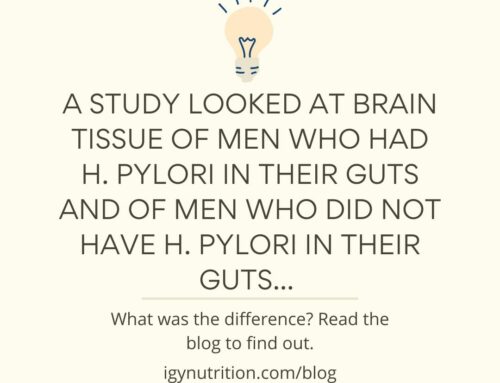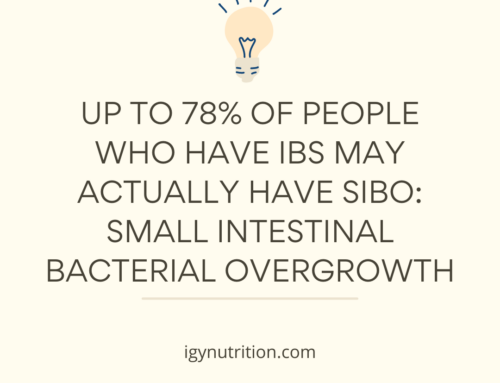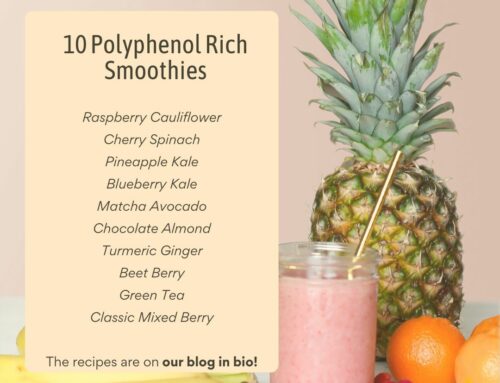If you’ve got iffy gut health – dysbiosis, SIBO, hormone fluctuations, whatever the culprit is – you might have a love-hate relationship with holiday dinner spreads.
Glazed meats + stuffing + egg nog + pie should equal joy, not abdominal pain!
The holidays are stressful enough as they are – we’re not here to police you on your holiday food choices. Instead, we put together some tips to make holiday eating easier on your gut. Let’s dive in.
What is Bloating, Anyway?
There are two feelings that people use the term “bloating” to refer to: a) holding extra water weight or feeling “puffy,” and b) extension of your abdominal area paired with gas.
Today, we’re talking about option b). Technically, this is called distention, not bloating, but people tend to use the terms interchangeably.
Abdominal distention is typically caused by a build-up of gas in your intestinal tract. But where does the gas come from?
Though in truth this process is much more complex than this, the shortened explanation is that bacteria and other microbes living in your gut microbiome feast on any unbroken-down food you eat and produce waste in the form of gas.
However, far less gas is produced if your food is thoroughly broken down before it makes contact with the majority of your gut microbiome in the large intestine.
That’s why people who are lactose intolerant experience severe distention and gas when they eat dairy – it’s because they can’t break dairy down (they lack the digestive enzyme lactase). If they eat it, bacteria living in their microbiome have a field day consuming the undigested dairy, thereby producing gas that builds up in the person’s GI tract.
So the key to limiting bloating is optimizing the breakdown of each food particle you put in your mouth.
Optimize Food Breakdown
There are a few ways we can achieve this.
Chewing
You might roll your eyes at this first tip, but trust us on this one: chew your food slowly. Making sure your food is broken down thoroughly before allowing your stomach and intestinal microbiome to take a crack at it will make your gut’s job easier.
You’ll likely need a bigger gun than thorough chewing if you’ve got a sensitive gut. That’s where digestive enzymes come in!
Stomach Acid
When you chew and swallow your food, its first stop is the stomach, where the food is broken down in preparation for absorption in the intestines (1).
Your stomach, a muscle, uses contractions to begin that process. But it needs a bit of chemical “umph” to get the job done: stomach acid (1,2).
Stomach acid is a mix of acids and enzymes that begin to disintegrate your food into smaller particles. Further on in your intestinal tract (past the stomach), other digestive enzymes are released to make your food thoroughly absorbable. Without them, we wouldn’t be able to use food for energy (2).
Low stomach acid or a lack of enzymes can lead to a host of digestive symptoms, including bloating, as we talked about above. Check out our blog titled “Do you Have Enough Stomach Acid?” to learn more.
Sometimes, over-eating or consuming hard-to-digest foods can make the thorough breakdown of food challenging to achieve.
Consuming digestive enzymes and stomach acid supplements before your meal may make breaking down your food more manageable.
Purchasing Supplements
You’ll want to purchase high-quality stomach acid supplements and digestive enzymes if you choose to go down that route.
Ideally, if you need enzyme support, you’ll choose one that contains pancreatic enzymes (protease, amylase, lipase), brush border enzymes, and microbiome enzymes. These are listed in the ingredients section. Check back for another blog coming soon about the different types of digestive enzymes.
If you need hardcore stomach acid support, find a supplement that contains both pepsin and a form of HCl. These are critical components of stomach acid. However, beware – it’s possible that you produce too much stomach acid. In this case, taking a supplement like this would make your symptoms worse. It’s always best to work with a healthcare professional before starting a stomach acid supplement, but if you aren’t able to, just make sure to proceed cautiously and pay attention to how your symptoms change after you start a supplement like this.
If you struggle to digest gluten or dairy specifically, we recommend adding a digestive enzyme specified for gluten and dairy to the mix.
Experiment with different ratios of stomach acid and enzymes to fit your personal needs. We recommend working with a healthcare professional to adjust your supplements as needed.
When to Drink
Another lesser-known strategy for optimizing stomach acid’s success is spacing food and beverages (especially water).
Some scientists assert that drinking water with meals may dilute your stomach acid and digestive enzymes, reducing their efficacy. This dilution may reduce the breakdown of your meal and thereby worsen your digestive symptoms.
This dilution principle applies to other beverages as well. We encourage you to enjoy the tasty drinks holidays call for – egg nog, wine, beer, you name it. Just know that consuming them in large quantities while eating may disrupt your digestion.
We recommend consuming your beverage of choice at least 20-30 minutes before or 30-40 minutes after your meal.
If you are looking to guzzle egg nog, beer, and wine in the middle of your meal, consider taking an extra dose of your digestive enzymes and stomach acid supplements.
Dysbiosis
Unless you’re overeating to the point of discomfort, your “food baby” after your holiday meal shouldn’t cause extreme digestive symptoms.
If you experience severe distention or bloating, constipation or diarrhea, or excessive gas, you’re likely dealing with a gut microbiome issue.
If you suspect a microbiome issue, we highly recommend investigating it. You’ll want to order a GI Map Stool Test, which will assess your microbiome composition.
Addressing your dysbiosis by rebalancing your microbiome will allow your body to properly digest food (even unhealthy holiday food).
How exactly do you rebalance your microbiome? You’ll want to support your beneficial gut bugs and get rid of your harmful gut bugs. Using supplements like probiotics, IgY Max, and stomach acid/enzymes will allow you to do that.
For more information on rebalancing your microbiome, check out our blogs on using IgY to combat dysbiosis.
Thanks for joining us today! Tag us in photos of your digestive wellness journey on Instagram @igynutrition.
References




